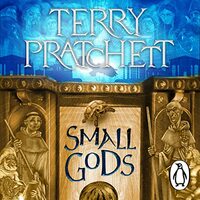Take a photo of a barcode or cover
adventurous
funny
hopeful
inspiring
lighthearted
mysterious
fast-paced
Plot or Character Driven:
Character
Strong character development:
Yes
Loveable characters:
Yes
Diverse cast of characters:
Yes
Flaws of characters a main focus:
Yes
funny
lighthearted
medium-paced
Plot or Character Driven:
A mix
Strong character development:
Yes
Loveable characters:
Yes
adventurous
funny
adventurous
funny
inspiring
lighthearted
reflective
medium-paced
Plot or Character Driven:
Character
Strong character development:
Yes
Loveable characters:
Yes
Diverse cast of characters:
No
Flaws of characters a main focus:
Yes
adventurous
medium-paced
adventurous
funny
lighthearted
reflective
fast-paced
Plot or Character Driven:
Character
Strong character development:
Yes
Loveable characters:
Yes
Diverse cast of characters:
Yes
Flaws of characters a main focus:
Yes
A remarkable novel that does not need any connection to the Discworld series to make it so. It seems clear that Pratchett set out to have a clear-eyed discussion about religion, with a minor detour into classical philosophy, and on those points alone it's an incredible book.
I'm glad it's been long enough since my original read for me to forget the ending because it got to me probably as much as it did the first time.
I can only approach this book from my own perspective as an atheistic reader, but it might have other things to offer those with a spiritual tradition.
Unsurprisingly, this book works because of some Pratchett gold standards: excellent character work (the evolutions of Om and Brutha are marvelous), deadly serious yet often wryly worded tackling of darker subject matter, which doesn't mean there can't be puns and disgruntled penguin goddess avatars, and a few moments spared to remember the importance of libraries, and just how stupid war is.
I could go into more detail about how well Pratchett lays out the arguments around organized religion, the nature and value of faith, but I don't think there's a substitute for reading the book, even if there may be moments where you wish things would go faster (hint: that's probably when you should slow down and think about it more).
Don't take my word for it, go read it!
⚠️torture, mention of slavery
I'm glad it's been long enough since my original read for me to forget the ending because it got to me probably as much as it did the first time.
I can only approach this book from my own perspective as an atheistic reader, but it might have other things to offer those with a spiritual tradition.
Unsurprisingly, this book works because of some Pratchett gold standards: excellent character work (the evolutions of Om and Brutha are marvelous), deadly serious yet often wryly worded tackling of darker subject matter, which doesn't mean there can't be puns and disgruntled penguin goddess avatars, and a few moments spared to remember the importance of libraries, and just how stupid war is.
I could go into more detail about how well Pratchett lays out the arguments around organized religion, the nature and value of faith, but I don't think there's a substitute for reading the book, even if there may be moments where you wish things would go faster (hint: that's probably when you should slow down and think about it more).
Don't take my word for it, go read it!
⚠️torture, mention of slavery
adventurous
funny
hopeful
mysterious
reflective
fast-paced
Plot or Character Driven:
A mix
Strong character development:
Yes
Loveable characters:
Complicated
Diverse cast of characters:
Yes
Flaws of characters a main focus:
Complicated
I found myself pausing and reflecting on the current state of the world as I read this. Though the way the story was told was funny at times, the underlying message, I felt, was quite serious, inviting us to think about the dangers of fanaticism, of unquestioning acceptance of authority and its message, and of the way religion can be used to justify the most vile and cruel acts imaginable. This is a story about false prophets and faith, about the journey of unlearning blind obedience, and how people who are not bad do bad things. The story also touches on the way a violent revolution can often be no more than an extension of previous violence and cutting down the leader means only that they are dead - change - true change - is work, lots of it, and it is grueling but worth doing.
Graphic: Religious bigotry
Moderate: Torture
Minor: War


